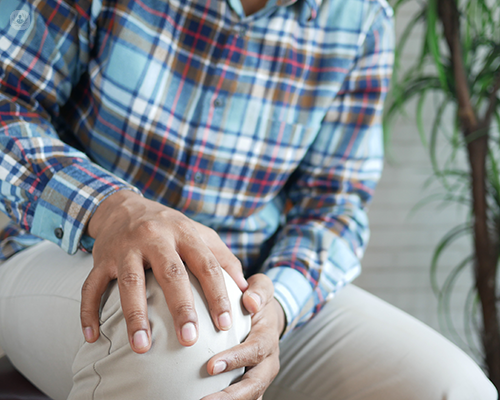How do I know if my knee pain is arthritis?
Autore:Knee arthritis is a common orthopaedic condition that develops when the joint structures of the knee, such as the cartilage and the bones, become damaged.
Here to provide an expert insight into knee arthritis, including symptoms, conservative measures and knee replacement surgery, is Mr Rohit Maheshwari, renowned consultant orthopaedic surgeon.

How do I know if my knee pain is arthritis?
Knee pain from arthritis causes symptoms of:
- stiffness and swelling
- increased pain and inflammation in the morning or after sitting
- increased pain after activity
- “locking” or “sticking” of the knee
- weakness or buckling in the knee
If you have knee pain that does not improve with time, it could be arthritis.
It is important to see a specialist if you are experiencing any of these symptoms. A specialist can diagnose the cause of your knee pain and recommend appropriate treatment options.
How is knee arthritis pain managed with conservative treatments?
There are several conservative treatments that can help to manage knee arthritis pain. These include:
- Exercise and physical therapy: Exercise and physical therapy are often the first-line approach. They can improve joint flexibility and strength, reduce pain and inflammation, and correct overall function.
- Splinting or bracing: Splinting or bracing can help support the knee joint and reduce pain.
- Anti-inflammatory agents: Anti-inflammatory agents, such as nonsteroidal anti-inflammatory drugs (NSAIDs), can help reduce pain and inflammation.
- Glucosamine and chondroitin: Glucosamine and chondroitin are supplements that may help reduce pain and inflammation in some people who have knee arthritis.
- Viscosupplementation: Viscosupplementation involves injecting a gel-like substance into the knee joint to lubricate the joint and reduce pain.
- Corticosteroids: Corticosteroids can be injected into the knee joint to reduce inflammation and pain.
- Extracorporeal shock wave therapy: Extracorporeal shock wave therapy is a non-invasive treatment that uses sound waves to stimulate healing in the knee joint.
When is knee replacement surgery considered?
Knee replacement surgery is considered when other treatments have failed to relieve pain and improve function.
Knee replacement surgery (also called knee arthroplasty) involves removing a damaged joint surface and replacing it with a metal and plastic implant. This surgery is performed on patients who have severe knee arthritis (most commonly, osteoarthritis) to alleviate pain and improve mobility.
How is knee replacement surgery performed? What are the risks involved?
Knee replacement surgery is performed under general anaesthetic. The procedure may vary depending on your condition and your doctor, but generally, knee replacement surgery follows this process:
- The surgeon makes an incision in the knee.
- The damaged bone and cartilage are removed from the knee joint.
- The surgeon replaces the damaged joint surface with an artificial joint made of metal and plastic.
- The surgeon closes the incision.
As with any surgical procedure, knee replacement surgery carries potential risks. These risks range from infection, pain, and blood clots.
Blood clots are one of the most serious risks of knee replacement surgery. If surgery damages a blood vessel or the patient does not move for several days after the procedure, blood flow can slow and a blood clot may form. A blood clot that develops in one of the deep veins in the legs is called deep vein thrombosis (DVT).
How long will my knee replacement last?
The majority of knee replacements can be expected to last at least 15 to 20 years. It is possible that a knee replacement can last 30 years.
Newer materials and designs of artificial knee joints make it possible for the replacement joint to last longer. Devices made with a combination of oxidized zirconium and highly cross-linked polyethylene have been shown to last longer.
If you are concerned about possible knee arthritis and wish to seek expert assessment and treatment for it, don't hesitate to book an appointment with Mr Rohit Maheshwari via his Top Doctors profile today.


